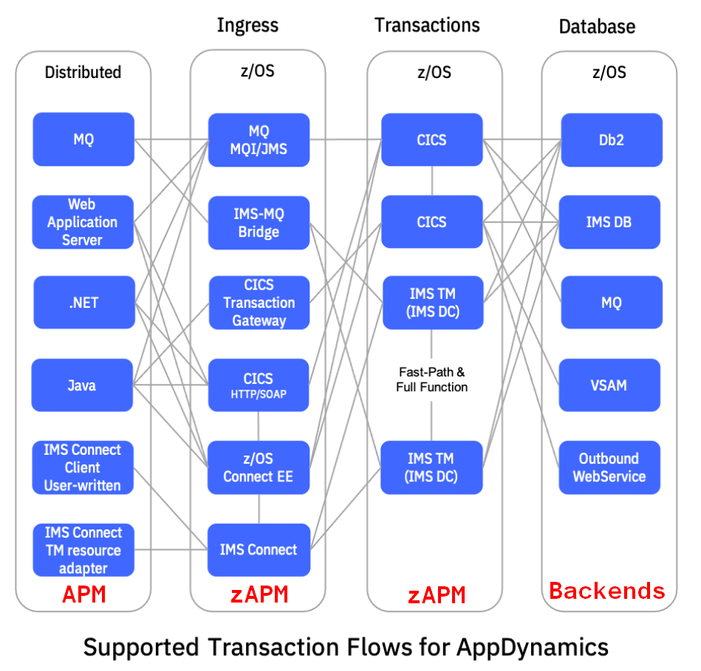- Community Hub
- Forum Q&A
- Business iQ (Analytics)
- Controller (SaaS, On Premise)
- Dashboards
- Dynamic Languages (Node.JS, Python, PHP, C/C++, Webserver Agent)
- End User Monitoring (EUM)
- Infrastructure (Server, Network, Database)
- Java (Java Agent, Installation, JVM, and Controller Installation)
- Licensing (including Trial)
- .NET (Agent, Installation)
- Smart Agent
- General Discussions
- Resources
- Groups
- Idea Exchange
Not a customer? Click the 'Start a free trial' link to begin a 30-day SaaS trial of our product and to join our community.
Existing Cisco AppDynamics customers should click the 'Sign In' button to authenticate to access the community
- Cisco AppDynamics Community
- Resources
- Knowledge Base
- How do I use AppDynamics and IBM Z APM Connect to ...
- Subscribe to RSS Feed
- Mark as New
- Mark as Read
- Bookmark
- Subscribe
- Printer Friendly Page
- Report Inappropriate Content
- Article History
- Subscribe to RSS Feed
- Mark as New
- Mark as Read
- Bookmark
- Subscribe
- Printer Friendly Page
- Report Inappropriate Content
on
01-18-2018
03:03 PM
- edited on
12-22-2021
07:53 PM
by
Claudia.Landiva
IBM Z APM Connect enables AppDynamics to track detailed transactions between individual z/OS subsystems
In this article…
Overview
As today's enterprise companies continue to innovate on top of existing technology stacks, they require improvement and visibility into legacy systems such as the mainframe. Absolutely vital to business, mainframe application workloads see significant increases from rising transaction volumes and new applications. Their resources are often under pressure.
Professionals building and supporting enterprise applications require end-to-end visibility, but most apps are composed of different services hosted in different environments and managed by different teams. Those teams need to manage this complexity—including operational silos and related communication and procedural pitfalls.
When facing a problem, how can IT Ops teams manage the process and reduce MTTR?
AppDynamics has partnered with IBM to provide transaction visibility into the mainframe subsystems using IBM’s z APM Connect.
The integration extends the visibility of AppDynamics Map iQ and Diagnostic iQ into mainframe subsystems, such as MQ, CICS, IMS DB, and DB2, allowing for faster problem identification. Data sharing facilitates collaboration between siloed groups and enables operations, developers, and DevOps teams to understand Mainframe dependencies and performance.
NOTE | The Mainframe Agent will consume 1-5 C++ SDK instances in the Controller. Z APM Connect needs to be licensed, but so does AppDynamics. Each CICS/IMS/ z/OS instance requires an APM Any license in AppDynamics.
Mainframe licensing requires the use of 1 AppDynamics Pro license for every 16 Value Units of Mainframe capacity in addition to the IBM license requirements for the IBM z APM Connect product.
Mainframe Technology Support
|
z/OS subsystems to monitor |
|
|
Monitor CICs subsystems |
Track IBM MQ to CICS transactions NOTE | Non-MSQ JMS messages might require additional configurations on the Distributed app and/or MQ queues |
|
Track CICS TG to CICS transactions |
|
|
Track z/OS Connect EE to CICS transactions |
|
|
Monitor IMS region and IMS Connect |
Track transactions entering IMS Connect through a user-written IMS Connect client |
|
Track transactions entering IMS Connect through an IMS Connect TM resource adapter |
|
|
Track z/OS Connect EE to IMS transactions |
|
|
Track IBM MQ to IMS transactions |
|
The following diagram shows all supported flows:
Getting Started
Requirements include a z/OS Mainframe, AppDynamics and a gateway box.
Customers interested in this feature can contact AppDynamics (email: techpartners @ appdynamics.com).
Learn More
- Mark as Read
- Mark as New
- Bookmark
- Permalink
- Report Inappropriate Content
Hi, can you point me to where I might find the hardware requirements for the Transaction Gateway server?
Also can this component reside on the Controller server?
Thank you,
Tom
- Mark as Read
- Mark as New
- Bookmark
- Permalink
- Report Inappropriate Content
Hello, Tom. You can find the full documentation here: https://www.ibm.com/support/knowledgecenter/en/SSYHZ9_5.5.0/com.ibm.omegamon_apm.doc/overview/zapm_o... to answer your question we don't really have any requirements for that system since it's not a system doing a lot of work. It can be installed on any Intel Linux system really. We had some preliminary hardware requirements, but during load testing, we found it needed far fewer resources. I will check with the product team just to verify this.
- Mark as Read
- Mark as New
- Bookmark
- Permalink
- Report Inappropriate Content
We now support additional subsystems with this including IMS, VSAM, and outgoing WebSphere.
![]()
Learn how Splunk and AppDynamics are redefining observability
Watch Now!
Dive into our Community Blog for the Latest Insights and Updates!
Read the blog here

Thank you! Your submission has been received!
Thank you! Your submission has been received!
Oops! Something went wrong while submitting the form



